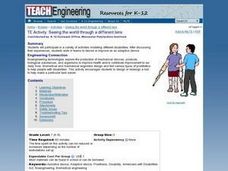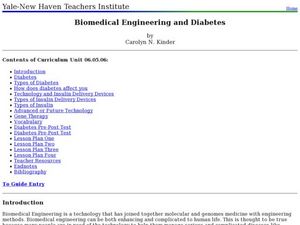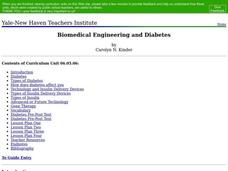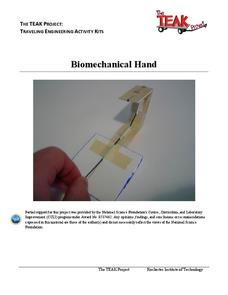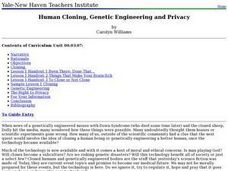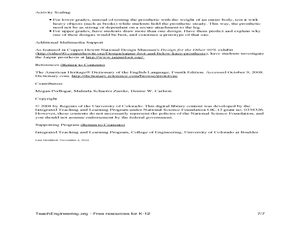Curated OER
Technology: Biomedical Engineering
Students participate in activities simulating various disabilities. After discussions, they work in teams to devise or improve on adaptive devices for people with disabilities. They include drawings of the tools they design and explain...
Curated OER
TE Activity: Broken Bones
Students examine the discipline of biomedical engineering or bioengineering. They complete worksheets by participating in reading background information and completing a hands on activity. They design a prototype of a cast to set a...
Curated OER
Biomedical Engineering and Diabetes
Students compare and contrast the three types of diabetes. In this technology lesson, students identify the causes of this disease. They investigate ways to deliver insulin to the body and present their findings in class.
Teach Engineering
Abdominal Cavity and Laparoscopic Surgery
Get to know the human body from the inside out. The first lesson plan in a series of 10 introduces the class to the abdominopelvic cavity. Biomedical engineers need to understand the region of the body as they develop and improve...
Curated OER
Biomedical Engineering and Diabetes
Young scholars discuss diabetes, it causes, and old and current technology to control the disease. They discuss biomedical engineering and new technology to control the disease. The examine the various types of insulin delivery systems...
Teach Engineering
Tell Me Doc—Will I Get Cancer?
Can you beat the odds of cancer? In the first installment of a seven-part series, future biomedical engineers consider how to detect and diagnose cancer. An article on biosensors provides useful information toward this goal.
Teach Engineering
Tissue Mechanics
Engage your class by showing them how silly putty and human tissues are alike. Pupils learn more about tissue mechanics by reflecting upon their experiences with silly putty. The lesson covers collagen, elastin, and...
Teach Engineering
How Effective is Your Sunscreen?
Protect skin from UV radiation! Groups design and conduct an experiment to test the effectiveness of UV safety products. The groups collect the data from the experiment and prepare a lab report. In the second day of the activity,...
Curated OER
Medical Instrumentation
Learners analyze how medical devices that help the human body function. They work in pairs or groups to draw multiple views of the medical device and describe how engineering is used by biomedial engineers.
Rochester Institute of Technology
Biomechanical Hand
In 1993, five biomedical engineers in Edinburgh, Scotland, created the first functional bionic arm. In the activity, learners explore the world of bioengineering through discussion and hands-on exploration. In groups, participants...
Teach Engineering
Nanotechnology and Cancer Treatments
Information on the biomedical use of nanotechnology, specifically in the detection and treatment of cancer, is the focus of a lesson that seems like it is out of a science fiction novel. Pupils learn about electrophoresis, which is used...
Teach Engineering
Viscous Fluids
Elasticity and viscosity. Help your class understand the similarities and differences with an introduction to viscous fluids. After describing four types of fluid behaviors: shear thinning, shear thickening, Bringham plastic,...
Teach Engineering
Mechanics of Elastic Solids
Make the connection between Hooke's law and elasticity with an activity that introduces the class to the behavior of elastic materials. The resource defines stress and strain to calculate the modules of elasticity of...
Curated OER
Human Cloning, Genetic Engineering and Privacy
Review the aspects of human cloning and the moral issues associated with it. Individually, your students will keep a list of the articles related to this issue and research issues related to the ethic issues people are concerned with....
NOAA
Biological Oceanographic Investigations – Call to Arms
How many simple machines does it take to make a robotic arm? An inquiry-based lesson plan explores that topic and challenges pupils to build a robotic arm that can stretch, turn, and more. A few questions help guide them in the...
Teach Engineering
The Keepers of the Gate Challenge
Help your class make a connection between salt water and nanoscience. In the introductory lesson of a seven-part unit, the class explores why salt water helps a sore throat feel better. Pupils conduct preliminary research about the...
Teach Engineering
Electromagnetic Radiation
How can nanoparticles be used in the battle against skin cancer. Class members take on the question as they gather information about electromagnetic radiation, specifically ultraviolet radiation. Pupils learn about the mathematical...
Teach Engineering
Microfluidic Devices and Flow Rate
When you have to flow, you have to flow. The activity introduces class members to microfluidic devices and their uses in medicine. They watch a short video on how the diameter affects the rate of flow. The worksheet has individuals...
Teach Engineering
The Grand Challenge
Magnetic resonance imaging, just how safe is it? The introduction to unit study of magnetic resonance imaging technology presents the grand challenge questions of how an MRI machine works, the risks involved, the physics involved,...
Teach Engineering
Skin and the Effects of Ultraviolet Radiation
Though UV radiation can damage skin, it isn't all bad. The third installment in a six-part series allows the class to study the structure and function of skin. They learn about the different types of skin cancer and the SPF rating...
Curated OER
Prosthetic Party
Students examine human anatomy by creating a prosthetic limb. In this medical engineering instructional activity, students view numerous images of prosthetics used in science today and define several medical terms associated with...
Rochester Institute of Technology
Laparoscopic Surgery
Nobody is as smart as all of us together. In a collaborative learning activity, scholars learn it takes a team to be successful in laparoscopic surgeries. Groups complete the laparoscopic task as a team and discuss their results to...
Teach Engineering
Fun With Nanotechnology
Introduce your class to nanotechnology applications with three demonstrations that showcase scientific principles related to ferrofluids, quantum dots, and gold nanoparticles. Groups will work more closely with these applications in the...
Teach Engineering
Heart to Heart
Begin a unit on the heart, the parts and the function of the heart, and about heart disease with a resource that includes a lecture, a PowerPoint presentation, and research information. The lesson is the first of a four-part series...
